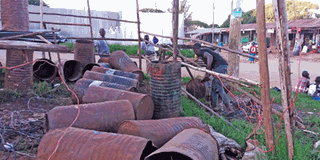Prime
Village leaders, police to monitor nsenene harvesters

Business. A man rolls a barrel to set up traps for grasshoppers in Masaka District last year. FILE PHOTO
What you need to know:
- Complaint. Grasshopper dealers under their umbrella have opposed new guidelines, calling them unfair.
MASAKA. As the grasshopper season sets in this week, power distributor Umeme has issued tough guidelines to streamline grasshopper trapping business in Masaka sub-region.
Under the new guidelines, all grasshopper trappers and dealers are required to register with the village authorities and police in their areas of operation before starting to operate.
The grasshopper dealers will also not be allowed to start working before their premises are inspected by Umeme staff.
Also, all sites where grasshoppers are trapped from, must be fenced off to limit access by intruders, especially children.
The new guidelines were announced by the Southern Region Umeme manager, Ms Petra Kyalisima, during a joint meeting for all grasshopper dealers and trappers in Masaka Town last week.
Ms Kyalisima said the guidelines will ensure safety of grasshopper trappers and other people who live near sites where the grasshoppers are trapped.
“As Umeme, we value people’s lives and since these people are using electricity, which is dangerous to their lives, we don’t want to see scenarios where innocent people are electrocuted,” Ms Kyalisima said.
She also warned that her team will conduct regular prompt inspections at all sites where grasshopper harvesting takes place to ensure that the dealers don’t steal electricity as it is usually been the case during the grasshopper season.
Kyalisima said grasshoppers trappers will also not be allowed to operate near transformers below 100kv because last season, Umeme lost at least 4 transformers to over loading by grasshopper trappers.
“We lost more than Shs400m in Masaka sub-region because the transformers were overloaded by grasshopper trappers and they ended up blowing,” she said.hopper season.
However, when Daily Monitor visited several sites where grasshoppers are trapped at the weekend, none of them had complied with Umeme’s new guidelines.
In response to the new guidelines, the grasshopper dealers under their umbrella body Old Masaka Basenene Association (OMBA), have opposed the guidelines, calling them unfair.
Mr Quraish Katongole, the chairperson of OMBA, said they are worried that the guidelines could send some of them out of business.
“Some guidelines are uncalled for. Our members are already subjected to exorbitant charges like paying inspection fees to Umeme (Shs41,300) and association registration fees (Shs100,000) and now getting clearance from LCs and police will also cost them money,” he lamented.
Meanwhile, Umeme has also revised the electricity tariffs upwards from Shs200,000 per bulb that was charged last season to Shs250,000.
This means that a grasshopper trapper using 10 ten bulbs will have to pay Shs2.5m, up from Shs2m that was paid last season.
Greater Masaka sub-region is renowned for its lucrative trade in grasshoppers, a valuable source of income for many people, mainly the youth.
Dealers in this business usually use shiny iron sheets lined up vertically into a barrel with bright bulbs suspended overhead to attract the grasshoppers into the trap.
When the grasshoppers come to the lights, they circle around them until they fall onto the sheets, and slid into the barrels and are trapped.


